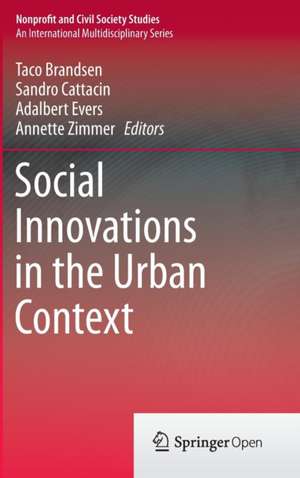Social Innovations in the Urban Context: Nonprofit and Civil Society Studies
Editat de Taco Brandsen, Sandro Cattacin, Adalbert Evers, Annette Zimmeren Limba Engleză Hardback – 12 apr 2016
1. What is the nature of social innovations?
2.What patterns can be identified in social innovations emerging at the local level?
3.How is the emergence and spread of social innovations related to urban governance? More precisely, which conditions and arrangements facilitate and hinders social innovation?
We explore these questions using different types of data and methods, and studying different contexts. In particular, we focus on innovations that aim at solving problems of the young unemployed, single parents and migrants. This analysis is based on original research carried out in the period 2010-2013 in the framework of a European project with a specific empirical research strategy. Research was carried out in 20 cities in 10 different European countries.
| Toate formatele și edițiile | Preț | Express |
|---|---|---|
| Paperback (1) | 423.08 lei 6-8 săpt. | |
| Springer International Publishing – 19 apr 2018 | 423.08 lei 6-8 săpt. | |
| Hardback (1) | 430.59 lei 6-8 săpt. | |
| Springer International Publishing – 12 apr 2016 | 430.59 lei 6-8 săpt. |
Din seria Nonprofit and Civil Society Studies
- 18%
 Preț: 893.71 lei
Preț: 893.71 lei - 18%
 Preț: 885.49 lei
Preț: 885.49 lei - 15%
 Preț: 644.82 lei
Preț: 644.82 lei - 18%
 Preț: 1227.84 lei
Preț: 1227.84 lei - 15%
 Preț: 643.34 lei
Preț: 643.34 lei - 15%
 Preț: 642.03 lei
Preț: 642.03 lei - 15%
 Preț: 639.59 lei
Preț: 639.59 lei - 15%
 Preț: 646.75 lei
Preț: 646.75 lei - 18%
 Preț: 950.03 lei
Preț: 950.03 lei - 18%
 Preț: 730.35 lei
Preț: 730.35 lei - 15%
 Preț: 643.99 lei
Preț: 643.99 lei - 18%
 Preț: 1006.24 lei
Preț: 1006.24 lei - 15%
 Preț: 643.34 lei
Preț: 643.34 lei -
 Preț: 431.56 lei
Preț: 431.56 lei - 18%
 Preț: 1225.48 lei
Preț: 1225.48 lei - 15%
 Preț: 639.41 lei
Preț: 639.41 lei - 15%
 Preț: 643.00 lei
Preț: 643.00 lei - 15%
 Preț: 635.15 lei
Preț: 635.15 lei - 15%
 Preț: 650.37 lei
Preț: 650.37 lei - 15%
 Preț: 701.40 lei
Preț: 701.40 lei - 18%
 Preț: 782.87 lei
Preț: 782.87 lei - 15%
 Preț: 644.95 lei
Preț: 644.95 lei - 15%
 Preț: 647.59 lei
Preț: 647.59 lei - 18%
 Preț: 727.97 lei
Preț: 727.97 lei - 18%
 Preț: 955.08 lei
Preț: 955.08 lei - 18%
 Preț: 952.40 lei
Preț: 952.40 lei - 15%
 Preț: 637.28 lei
Preț: 637.28 lei - 24%
 Preț: 798.43 lei
Preț: 798.43 lei - 15%
 Preț: 651.19 lei
Preț: 651.19 lei
Preț: 430.59 lei
Nou
Puncte Express: 646
Preț estimativ în valută:
82.39€ • 86.24$ • 68.58£
82.39€ • 86.24$ • 68.58£
Carte tipărită la comandă
Livrare economică 31 martie-14 aprilie
Preluare comenzi: 021 569.72.76
Specificații
ISBN-13: 9783319215501
ISBN-10: 3319215507
Pagini: 300
Ilustrații: XIII, 313 p. 2 illus. in color.
Dimensiuni: 155 x 235 x 30 mm
Greutate: 0.64 kg
Ediția:1st ed. 2016
Editura: Springer International Publishing
Colecția Springer
Seria Nonprofit and Civil Society Studies
Locul publicării:Cham, Switzerland
ISBN-10: 3319215507
Pagini: 300
Ilustrații: XIII, 313 p. 2 illus. in color.
Dimensiuni: 155 x 235 x 30 mm
Greutate: 0.64 kg
Ediția:1st ed. 2016
Editura: Springer International Publishing
Colecția Springer
Seria Nonprofit and Civil Society Studies
Locul publicării:Cham, Switzerland
Public țintă
ResearchCuprins
Part I: Introduction.- Chapter 1: Social Innovation: A Sympathetic and Critical Interpretation.- Part II: Urban contexts for local innovations.- Chapter 3: “Everybody on Board? Opportunity Structures for Social Innovations in Münster”.- Chapter 4: Inertia, Clearings, and Innovations in Malmö.- Chapter 5: Birmingham, Priority to Economics, Social Innovation at the Margins.- Chapter 6: Social Policies and Governance in Geneva: What about Social Innovation?.- Chapter 7: Milan, a City Lost in the Transition from the Growth Machine Paradigm Towards a Social Innovation Approach.- Chapter 8: Poor but Sexy? Berlin as a Context for Social Innovation.- Part III: Local Social Innovations.- Chapter 9: Social Innovations as Messages: Democratic Experimentation in Local Welfare Systems.- Chapter 10: Warsaw: Paving new ways for participation of mothers, fathers and children in local public and social life - The MaMa Foundation.- Chapter 11: Zagreb: Parents in Action – Innovative ways of support and policies for children, women and families.-Chapter 12: Amsterdam: Neighbourhood Stores for Education, Research, and Talent Development – the BOOT project.- Chapter 13: Lille: Co-production of housing in a major urban renewal district.- Chapter 14: Pamplona: Neighbourhood Children services – a grassroots and local council initiative.- Chapter 15: Berlin: Kreuzberg acts – entrepreneurship in the district.- Chapter 16: Milan: “We help you to help yourself”. The project of the Fondazione Welfare Ambrosiano.- Chapter 17: Stockholm: Innovative ways of supporting children of single (lone) mothers.- Chapter 18: NijmEGEN: Work corporations - for the unemployed, by the unemployed.- Chapter 19: Birmingham: The Youth Employment and Enterprise Rehearsal project.- Chapter 20: Birmingham: A “locality approach” to combating worklessness.- Chapter 21: Münster: How PreventionVisits Improve Local Child Protection.- Chapter 22: BARCELONA: A citizen´s agreement for an inclusive CITY.- Chapter 23: Bern: Integration guidelines.- Part IV: Conclusions.- Chapter 24: The Implicit Normative Assumptions of Social Innovation Research: Embracing the Dark Side.- Chapter 25: The Good, the Bad and the Ugly in Social Innovation.
Notă biografică
Taco Brandsen is Professor of Comparative Public Administration at Radboud University Nijmegen, The Netherlands; Secretary-General of EAPAA (European Association of Public Administration Accreditation); Coordinator of the project WILCO (2010-2013, ‘Welfare Innovations at the Local Level’, 7th European Framework Programme.) and a member of the LIPSE project (2013-2016, ‘Learning from Innovation in Public Sector Environments’, 7th European FrameworkProgramme).
Sandro Cattacin studied economic history, political science and political philosophy at the University of Zurich (1982–1987). With an Italian fellowship he then participated in the PhD programme in political and social science at the European University Institute in Florence (1987–1990) where he obtained his PhD in 1992.
Adalbert Evers is Professor for Comparative Health and Social Policy at the Justus Liebig University in Giessen (Germany); (Emeritus since October 2013). He holds a doctoral degree in political science from the University of Bremen and did his Habilitation at the University of Frankfurt.
Annette Zimmer is Professor of Social Policy and Comparative Politics at the Institute of Political Science at the University of Münster, Germany. She holds a doctoral degree in political science from the University of Heidelberg, and a lecturer degree in political science from the University of Kassel, Germany.
Sandro Cattacin studied economic history, political science and political philosophy at the University of Zurich (1982–1987). With an Italian fellowship he then participated in the PhD programme in political and social science at the European University Institute in Florence (1987–1990) where he obtained his PhD in 1992.
Adalbert Evers is Professor for Comparative Health and Social Policy at the Justus Liebig University in Giessen (Germany); (Emeritus since October 2013). He holds a doctoral degree in political science from the University of Bremen and did his Habilitation at the University of Frankfurt.
Annette Zimmer is Professor of Social Policy and Comparative Politics at the Institute of Political Science at the University of Münster, Germany. She holds a doctoral degree in political science from the University of Heidelberg, and a lecturer degree in political science from the University of Kassel, Germany.
Textul de pe ultima copertă
This book addresses the practice of social innovation, which is currently very much in the public eye. New ideas and approaches are needed to tackle the severe and wicked problems with which contemporary societies are struggling. Especially in times of economic crisis, social innovation is regarded as one of the crucial elements needed to move forward. Our knowledge of its dynamics has significantly progressed, thanks to an abundance of studies on social innovation both general and sector-specific. However, despite the valuable research conducted over the past years, the systematic analysis of social innovation is still contested and incomplete. The questions asked in the book are the following:
1. What is the nature of social innovations?
2.What patterns can be identified in social innovations emerging at the
local level?
3.How is the emergence and spreadof social innovations related to urban
governance? More precisely, which conditions and arrangements facilitate
and hinders social innovation?
We explore these questions using different types of data and methods, and studying different contexts. In particular, we focus on innovations that aim at solving problems of the young unemployed, single parents and migrants. The analysis is based on original research carried out in the period 2010-2014 in the framework of the European project WILCO.
Caracteristici
Provides a systematic analysis of local social innovations in European cities, with coverage of the implications for urban governance Highlights innovations that aim at solving problems of the young unemployed, single parents and migrants Discusses the nature of social innovations Includes supplementary material: sn.pub/extras













